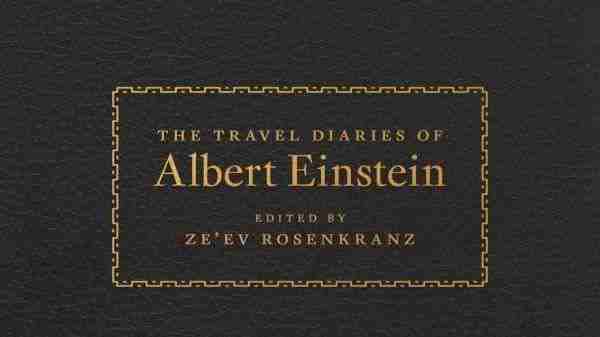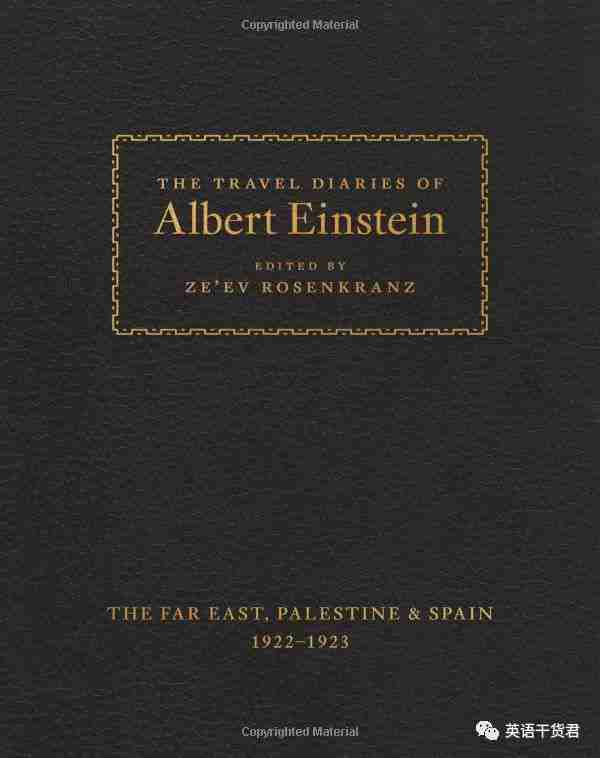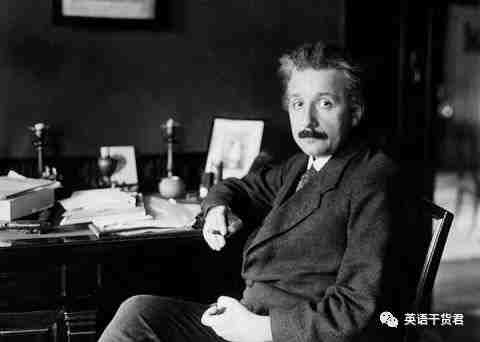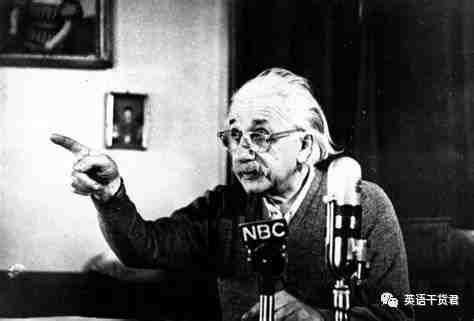毁三观:看爱因斯坦如何污蔑我们中国人!


导读:在1922年的秋天,在荣获诺贝尔物理奖之后,爱因斯坦和他当时的发妻,进行了一次为期五个半月的东游记,他们去了香港、新加坡、中国大陆、日本、巴基斯坦等地方。爱因斯坦在自己的日记中写下了旅途中的所见所闻,所思所想。这本日记在上月的29日被印刷出版,这个在当时已举世闻名的犹太人对中国人的种族歧视真是让人大跌眼镜:这位20世纪的人道主义形象大使却曾经有着像希特勒一样的种族偏见!!!
其中,对当时香港的描述,爱因斯坦使用了这样的字眼:过度繁殖(the fecundity)、不具备逻辑思维能力(incapable of being trained to think logically)、搞不懂中国女人到底有什么让男人无法抵抗的魅力(don`t understand what kind of fatal attraction Chinese women possesses which enthralls the corresponding men to such an extent)。
而对于当时的中国内地,这位理论物理学家是这么描述的:勤劳、肮脏、愚钝(industrious, filthy, obtuse);中国的孩子:死气沉沉的,愚钝的;如果让中国人取代其他所有民族,将是莫大的悲哀(It would be a pity if these Chinese supplant all other races)
下面这篇文章,是the Guardian对该日记的介绍。

The publication of Albert Einstein’s private diaries私人日记 detailing his tour of Asia in the 1920s reveals the theoretical physicist理论物理学家 and humanitarian icon人道主义的代表人物’s racist持种族偏见的 attitudes to the people he met on his travels, particularly the Chinese.
Written between October 1922 and March 1923, the diaries see the scientist musing on his travels, science, philosophy and art. In China, the man who famously once described racism as “a disease of white people” describes the “industrious, filthy肮脏的,污秽的, obtuse愚笨的 people” he observes. He notes how the “Chinese don’t sit on benches长椅 while eating but squat蹲坐 like Europeans do when they relieve themselves out in the leafy woods. All this occurs quietly and demurely严肃地. Even the children are spiritless无精打采的 and look obtuse.” After earlier writing of the “abundance of offspring后代” and the “fecundity多产” of the Chinese, he goes on to say: “It would be a pity if these Chinese supplant替代 all other races. For the likes of us对我们这种人来说 the mere thought is unspeakably dreary.”
Ze’ev Rosenkranz, senior editor and assistant director of the Einstein Papers Project at the California Institute of Technology, said: “I think a lot of comments strike us as pretty unpleasant – what he says about the Chinese in particular.

“They’re kind of in contrast to对比 the public image of the great humanitarian icon. I think it’s quite a shock to read those and contrast them with his more public statements. They’re more off guard措手不及的, he didn’t intend them for publication.”
Rosenkranz has edited and translated The Travel Diaries of Albert Einstein, which have just been published for the first time as a standalone单独的 volume by Princeton University Press, including facsimiles摹本 of the diary pages. The diaries have only previously been published in German as part of the 15-volume Collected Papers of Albert Einstein, with small supplementary translations into English. A spokesperson for Princeton University Press said: “This is the first time Einstein’s travel diary will be made available to anyone who isn’t a serious Einstein scholar.”
Further passages in the diaries, which are thought to have been written for Einstein’s stepdaughters in Berlin while he and his wife were travelling in Asia, Spain and Palestine, and as an aide memoire回忆录, see him writing of the Chinese that “even those reduced to working like horses never give the impression of conscious suffering. A peculiar herd-like nation [ … ] often more like automatons than people.” He later adds, in Rosenkranz’s words, “a healthy dose of extreme misogyny厌恶女性” to his xenophobia仇外情绪 with the observation: “I noticed how little difference there is between men and women; I don’t understand what kind of fatal attraction Chinese women possess which enthrals迷住 the corresponding men to such an extent that they are incapable of defending themselves against the formidable可怕的 blessing of offspring”.
In Colombo in Ceylon, Einstein writes of how the locals “live in great filth and considerable stench恶臭 at ground level” adding that they “do little, and need little. The simple economic cycle of life.”
Einstein’s perceptions of the Japanese he meets are, in contrast, more positive: “Japanese unostentatious朴素的, decent, altogether very appealing,” he writes. “Pure souls as nowhere else among people. One has to love and admire this country.” But Rosenkranz points out that he also concludes that the “intellectual needs of this nation seem to be weaker than their artistic ones – natural disposition性情?”
“Einstein’s diary entries on the biological origin of the alleged intellectual inferiority劣等 of the Japanese, Chinese, and Indians are definitely not understated and can be viewed as racist – in these instances, other peoples are portrayed as being biologically inferiors, a clear hallmark标志 of racism. The disquieting令人不安的 comment that the Chinese may ‘supplant all other races’ is also most revealing in this regard,” writes Rosenkranz.
“Here, Einstein perceives a foreign ‘race’ as a threat, which … is one of the characteristics of是…的特征 a racist ideology. Yet the remark that must strike the modern reader as most offensive冒犯的 is his feigning假装 not to understand how Chinese men can find their women sufficiently attractive to have offspring with them. In light of鉴于 these instances, we must conclude that Einstein did make quite a few racist and dehumanising非人性化的 comments in the diary, some of which were extremely unpleasant.”
Rosenkranz told the Guardian that although views like Einstein’s were prevalent盛行的 at the time, they were not universal. “That’s usually the reaction I get – ‘we have to understand, he was of the zeitgeist时代思潮, part of the time’ – but I think I tried here and there to give a broader context. There were other views out there, more tolerant views,” he said.
In his introduction, Rosenkranz writes how it is important to explore how a humanist icon such as Einstein – whose image was once used for a UNHCR campaign with the slogan “A bundle of belongings isn’t the only thing a refugee brings to his new country. Einstein was a refugee” – could have written xenophobic comments about the peoples he encountered.
“The answer to this question seems very relevant in today’s world, in which the hatred of the other is so rampant猖獗的 in so many places around the world,” he writes. “It seems that even Einstein sometimes had a very hard time recognising himself in the face of the other.”
个人觉得,爱因斯坦虽然有这样的瑕疵,但毕竟在受到希特勒政府的种族迫害,被迫移居美国后,终于认识到种族歧视对人类的巨大伤害,一直致力于世界的和平以及人与人的平等,所以,我还是会继续有保留地尊重这位伟大的科学家。至于摩根·费里曼,太毁我三观了,已经被移到hatred list中了。

最新评论
推荐文章
作者最新文章
你可能感兴趣的文章
Copyright Disclaimer: The copyright of contents (including texts, images, videos and audios) posted above belong to the User who shared or the third-party website which the User shared from. If you found your copyright have been infringed, please send a DMCA takedown notice to [email protected]. For more detail of the source, please click on the button "Read Original Post" below. For other communications, please send to [email protected].
版权声明:以上内容为用户推荐收藏至CareerEngine平台,其内容(含文字、图片、视频、音频等)及知识版权均属用户或用户转发自的第三方网站,如涉嫌侵权,请通知[email protected]进行信息删除。如需查看信息来源,请点击“查看原文”。如需洽谈其它事宜,请联系[email protected]。
版权声明:以上内容为用户推荐收藏至CareerEngine平台,其内容(含文字、图片、视频、音频等)及知识版权均属用户或用户转发自的第三方网站,如涉嫌侵权,请通知[email protected]进行信息删除。如需查看信息来源,请点击“查看原文”。如需洽谈其它事宜,请联系[email protected]。